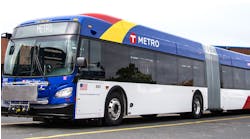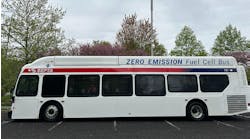Mar. 23—LAWRENCE — It's 2:30 sharp, Wednesday.
This March afternoon in Women's History Month, which celebrates the nation's female trailblazers, several women here at the Buckley Transportation Center are doing less celebrated work.
Nonetheless they're striking a note for equality, breaking ground on a turf traditionally thought to be a male terrain.
They're driving buses, moving lives — others' and their own — forward, where they need to go.
Bus driver Paula Diaz-Brito turns her steering wheel.
She joins the MeVa transit convoy streaming into daylight from the giant garage that is the Buckley transportation hub.
Among the navigators in this parade of tropically colored buses and whining engines are three women.
They and nine other women compose 15% of MeVa's roster of 83 drivers, maneuvering buses up to 35 feet long and weighing 15 tons over busy streets from Lawrence to Newburyport.
MeVa, the Merrimack Valley's regional transit authority, one of 15 across the state, has for the past two years worked to recruit and maintain more women drivers.
The endeavor has resulted in more women hired, a moderate and hard-won gain, up from 12 to 15% on the fixed routes.
MeVa's increase has been greater, to 20% women, in its minibus ranks.
There, six women, including Donna Phair, a former Dunkin' server and limo driver, respond to requested rides to places such as kidney dialysis centers.
Brito's bus route, the No. 8, "The Ocho," crosses the mighty Merrimack and stops as requested by riders on the way to the North Andover Plaza and Market Basket and the Wood Ridge apartments.
A low rumble is the ambient sound. Monitors flash destinations and updates about route changes.
A plainspoken voice from the sound system announces the next stop in an eerily wonderful tone and simplicity reminiscent of the legendary Fenway Park public address announcer Sherm Feller (who wrote the song "Summertime, Summertime").
"No. 8, Carl Yastrzemski. Left field, Yastrzemski."
Only here, it is something like "Next stop. North Andover Plaza."
Brito, of Lawrence, has been on the job for six months after driving a school bus for seven years.
She came to MeVa for the benefits package. She, like other women, and men, seek opportunity for their families and themselves while getting people to the grocery store, doctor's offices, workplaces and schools including Northern Essex Community College and UMass Lowell.
Opportunity knocked for MeVa employee Jessenia Fernandes.
She arrived from Puerto Rico in 2006 after graduating high school and worked 11 years as a certified nursing assistant.
In 2016, she got her CDL license, determined to make a better life for her children, a boy, 11, and a girl, 6 years old.
In 2017, when the North Andover resident was hired as a MeVa driver, she was daunted, scared.
"It was a huge vehicle in the city," she said, in an interview at Buckley. "Working with a lot of people, a lot of emotions at the same time."
Support from supervisors and fellow drivers built her confidence. She found she liked public transportation, and says she grew as a person by interacting with an array of passengers.
Fernandes drove for three years and then became a supervisor, parachuting in to help when difficulties arose across the 24 fixed routes served.
She wore multiple hats, acting as nurse, psychologist, police and more. She is now MeVa's Safety and Training Officer.
Yuli Diaz, of Lawrence, a MeVa bus driver for the past two years, was previously a Haverhill public works truck driver, but having to navigate a long bus and people's emotions takes dexterity, she said.
"I had a guy, over a year ago, he OD'd in my bus," she said. She had noticed he was shaking and pulled over and approached him and saw he was in extreme distress.
Maintaining her composure, she called dispatch. Police responded and administered two or three doses of Narcan and revived him. He became agitated and they had to restrain him.
MeVa administrator Noah Berger says the transit system's move to fare free transportation, two years ago, has not only led to a boom in ridership but greatly reduced potential for conflict. Drivers also receive regular deescalation training from assistant director Juan Guillermo.
Some women drivers arrive at MeVa with confidence and experience. Tracy Bagley drove public transit buses in Chico, California for seven years before coming to MeVa 16 years ago.
The drivers here help each other, share information about passengers' needs or route questions.
Bagley recently dealt with breast cancer and Brito made her a coffee cup to let her know she was thinking of her.
Driver Michele Zammitti graduated from Amesbury High in 1984 and went to work on the Big Dig in Boston ( Central Artery I-93, tunnel construction) first as a miner in the tunnel and then as a Teamster driving an articulated dump truck.
Then she took time off to raise her kids. She's been driving for MeVa for five years, attracted by the benefits package.
Finding day care remains a barrier to hiring more women, Berger says.
It's the same in other driving professions such as over-the-road trucking.
Women make up only 12% of truckers, according to the Women Trucking Association, and day care remains a prime reason why the numbers are not higher.
MeVa's Communications Director Niorka Mendez drove buses here for several years, starting around 2016, but needed to find day care for her children, and, fortunately, found it.
Her daughter, Iara Almonte, now 14, remembers being excited to board the bus as a child with her grandmother or aunt and see her mom behind the wheel.
At the end of the day, her mom came home tired, says Iara, who attends The Academy at Penguin Hall in Wenham, where art is her favorite subject.
She's unsure what would be on the canvas if she were to paint a picture of her mother as a bus driver, but the predominant color would be yellow, like sunshine.
MeVa is now looking at finding a day care provider that can accommodate the early start and split shifts that fall to many new hires.
An earlier idea, giving employees vouchers for day care, would have had to be negotiated as part of the union contract, and proved too complicated to pursue.
Back on the No. 8, at a requested stop, a man pauses before stepping off and asks Brito which side of the road is best to flag a bus bound for the RMV.
Brito tells him it's the other side, the inbound side.
A woman, sitting in the middle of the bus, Carmita Delgada, of Lawrence, 81, rides often and depends on it for shopping and appointments. Now, she is headed to Marshalls.
All the drivers are nice, but if she had to name a preference, it would be women.
"They have more patience than men," she says.
Females make up more than 50 percent of the population, of the number of public transportation users and of licensed motor vehicle operators.
But only a slice, 10 to 15%, of transit bus drivers nationwide are women.
They represent a large pool of potential drivers at a time when employers routinely scramble and compete to fill open positions, says Berger.
Challenges remain, including how to encourage more women to think of public transportation as a viable career path and to overcome the scheduling and day care obstacles that, for women, who do a disproportionate share of child rearing, can be deal breakers.
It is always hard when you have an industry that is historically male dominated, because people tend to pursue careers that have people like them working the jobs, Berger says.
But the more girls and other women see female bus drivers the more they'll recognize them as potential role models.
Sometimes, seemingly small items related to gender make a difference in job satisfaction.
Brito says the MeVa unisex uniform is designed for male drivers. Especially the pants, which, for women, can fit in unflattering ways.
She suggested a uniform change for women, and, now, more high-riding and comfortable and roomy pants for women have been ordered.
On the inbound portion of the No. 8 route, an elderly woman steps aboard the bus at Market Basket in North Andover, clutching three brown grocery bags.
A man, a helpful stranger, carries a fourth bag on the bus for her.
Soon the bus swells to standing room capacity.
A throng of teens by Lawrence High School tromp aboard, talking excitedly.
The bus stops a few hundred feet away, outside a fast food restaurant, and another 15 teens board. These kids prefer the MeVa bus because it gets them home sooner than the school bus.
Brito pulls the bus into Buckley at 3:30 sharp and it exhales loudly, the sound of deflating airbags to lower the bus and make it easier to step off.
The driving and riding rhythm continues.
Buses line the garage. Drivers break from small huddles and stride to their buses, load passengers and pull from the station — men and women in the drivers' seats.
___
(c)2024 The Eagle-Tribune (North Andover, Mass.)
Visit The Eagle-Tribune (North Andover, Mass.) at www.eagletribune.com
Distributed by Tribune Content Agency, LLC.

